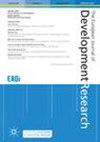Mismatching Skills, The Currect Problem Among Vocational Graduates in East Java
IF 2.6
3区 社会学
Q2 DEVELOPMENT STUDIES
引用次数: 0
Abstract
Preliminary study at Trenggalek Regency show that most of vocational graduates from multimedia department work as shopkeeper on the department stores or as a salesman/saleswoman. This fact realize us that the purpose of vocational high school is not achieved yet. The research aims to describe and present mismatching skills data among vocational graduates. This study is descriptive with quantitative approach which focuses on multimedia department. The data will gained from 2 public schools. This data is collected from students who graduate on 2017 school year in SMK Raya and three generation graduates from SMKN Jaya. The method that been used are documentation and interview from career center at each school. As a result from 279 vocational graduates on multimedia department, graduates who study in the suitable field is 9%, who continue their study in the different field 27%, who work on the appropiate field approximately 18%, who get their work in the different field around 38%, and 8% of graduates still in the waiting period. Finally, the conclusion is vocational graduates can’t fill yet the job market at suitable field. Therefore, role of all education stakeholder are needed to reduce mismatching skills between background of study and field of work.东爪哇省高职毕业生技能不匹配的现状
初步研究表明,多媒体专业的毕业生大多在百货商店担任掌柜或售货员。这一事实使我们认识到职业高中的办学目的还没有达到。本研究旨在描述和呈现高职毕业生的技能错配数据。本研究以多媒体系为研究对象,采用定量描述的方法。数据将从两所公立学校获得。这些数据是从SMK Raya的2017学年毕业生和SMKN Jaya的三代毕业生中收集的。所采用的方法是每所学校就业中心的文件和面试。对279名多媒体系高职毕业生的调查结果显示,在合适的专业学习的毕业生占9%,在不同的专业继续学习的毕业生占27%,在合适的专业工作的毕业生约占18%,在不同的专业工作的毕业生约占38%,还有8%的毕业生仍处于等待期。最后得出结论,高职毕业生还不能在合适的领域填补就业市场。因此,需要所有教育利益相关者的作用,以减少学习背景和工作领域之间的技能不匹配。
本文章由计算机程序翻译,如有差异,请以英文原文为准。
求助全文
约1分钟内获得全文
求助全文
来源期刊

European Journal of Development Research
DEVELOPMENT STUDIES-
CiteScore
5.70
自引率
4.00%
发文量
77
期刊介绍:
The European Journal of Development Research (EJDR) redefines and modernises what international development is, recognising the many schools of thought on what human development constitutes. It encourages debate between competing approaches to understanding global development and international social development. The journal is multidisciplinary and welcomes papers that are rooted in any mixture of fields including (but not limited to): development studies, international studies, social policy, sociology, politics, economics, anthropology, education, sustainability, business and management. EJDR explicitly links with development studies, being hosted by European Association of Development Institutes (EADI) and its various initiatives.
As a double-blind peer-reviewed academic journal, we particularly welcome submissions that improve our conceptual understanding of international development processes, or submissions that propose policy and developmental tools by analysing empirical evidence, whether qualitative, quantitative, mixed methods or anecdotal (data use in the journal ranges broadly from narratives and transcripts, through ethnographic and mixed data, to quantitative and survey data). The research methods used in the journal''s articles make explicit the importance of empirical data and the critical interpretation of findings. Authors can use a mixture of theory and data analysis to expand the possibilities for global development.
Submissions must be well-grounded in theory and must also indicate how their findings are relevant to development practitioners in the field and/or policy makers. The journal encourages papers which embody the highest quality standards, and which use an innovative approach. We urge authors who contemplate submitting their work to the EJDR to respond to research already published in this journal, as well as complementary journals and books. We take special efforts to include global voices, and notably voices from the global South. Queries about potential submissions to EJDR can be directed to the Editors.
EJDR understands development to be an ongoing process that affects all communities, societies, states and regions: We therefore do not have a geographical bias, but wherever possible prospective authors should seek to highlight how their study has relevance to researchers and practitioners studying development in different environments. Although many of the papers we publish examine the challenges for developing countries, we recognize that there are important lessons to be derived from the experiences of regions in the developed world.
The EJDR is print-published 6 times a year, in a mix of regular and special theme issues; accepted papers are published on an ongoing basis online. We accept submissions in English and French.
 求助内容:
求助内容: 应助结果提醒方式:
应助结果提醒方式:


